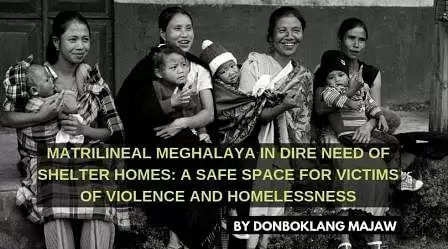Matrilineal Meghalaya in dire need of shelter homes: A safe space for victims of violence and homelessness

By Donboklang Majaw | May 09, 2019
For women who are at risk of or have been subjected to violence and abuse, shelter homes provide more than just a temporary safe and secure accommodation. These safe spaces or homes also aim to enable the women to recover from the violence, to rebuild their self-esteem, empowering them to take steps towards regaining a self-determined and independent life.
ALSO READ:
An organisation fighting for women's rights for more than 24 years in the region, the North East Network (NEN), Meghalaya has conducted a thorough study in five Districts in Meghalaya pertaining to the need for shelter homes for women as part of the Five State Action Research Study. Findings of the study was disseminated on 29th March, 2019 with the support from the Meghalaya State Commission for Women (MSCW). The data collected from the five districts, East Khasi Hills, West Khasi Hills, West Jaintia Hills, West Garo Hills and Ri Bhoi District also attempts to "document the roles played by various stakeholders around the theme of providing safe space for women who had faced violence".

As of today, there are only 2 Shelter Homes for women in Meghalaya which are established only in mid-2018, at Nongstoin and Shillong respectively. Although there are alternative safe spaces for women prior to the establishment of the said Shelter homes in the form of hospitals, children's homes and missionary welfare homes in and around the state.
Under the title, "Revisioning Shelter Homes in Meghalaya", the study's main concern was to assess, analyse and recommend certain factors that will minimize the vulnerability scale of women living in shelter homes. NEN hopes that the study will provide as a reference point in the future debates and discussions on the improvement the status of women in Meghalaya.

Meghalaya, a state predominantly comprised of the Khasi and Garo people who follows a matrilineal system, is oftentimes falsely celebrated as 'matriarchal' though the actual system followed is as patriarchal as in any other states in the region. Thus, the findings of the study could very well pave way for better understanding of this dualistic system of family tradition in the State. As NEN mentioned in its study "Women enjoys property rights but for women coming from poor and landless families, these rights are meaningless". Violence and subsequent homelessness among women in Meghalaya are a not so rare phenomena as the study concludes. An ironic find indeed.
The study goes on to state that "Over one-fourth of women between the ages of 15-49 in Meghalaya have experienced physical violence. Only twelve percent of women who have experienced physical or sexual violence by anyone have sought help. Three fourth of women has neither sought help nor told anyone about the violence they had faced."
The study also showed that a staggering 404 cases of domestic violence were registered at Iohlynti, a support centre for women, from November 2011 till date. Most of the cases however remains unreported due to the fact that domestic violence in Meghalaya is still largely seen as a family issue which is usually settled by the "kur", a person's clan or the "Dorbar Shnong", a traditional administrative intuition at the grass root level.
Multiple types of violence – economic, physical, verbal and mental abuse are the most prevalent amongst women.
In depth interviews with 16 women who had been living and currently living in alternate safe spaces along with survivors who have never resided in these homes provides ample material for the study. Although it was reportedly difficult for the research team to approach the women due to the lack of follow-up cases by the service providers and the scanty number of shelter homes in the state.
The study also describes the various factors that has or may contribute to the homelessness or "houselessness" of women:
- Domestic violence
- Cohabitation and early marriage
- Differences in religious faith among couples
- Death of relatives
When asked about the essentials constituting a shelter home, participants of the study felt that a shelter home should be home away from home, a place where they can feel safe and not looked upon as people with problems.
Many participants from the city also expressed the need for shelter homes within the proximity of the city rather than the outskirts as most of them would like to continue with their jobs even as residents of the said shelter homes. All in all, the participants would like to be respected for being able to come out in their seeking for help, to be acknowledged as survivors rather than victims.
The establishment of the two shelter homes/Swadhar Greh in 2018, the study concludes, is an encouraging step. However, the Government of Meghalaya may also need to regularly assess the conditions and the nature of these shelter homes apart from increasing their numbers in the State. With proper resources, shelters can also provide the range of protection and support services necessary to help survivors and those at risk of violence to avoid future abuse. The establishment of the said shelters can also contribute to raising awareness and if possible, a sort of a social revolution as part of wider range of exertions to prevent violence against women and girls altogether.
Featured image courtesy: Hindustan Times
The writer can be reached at donboklangmajaw@gmail.com. You can also mail your articles to shweta@thenortheasttoday.com and iban@thenortheasttoday.com

















